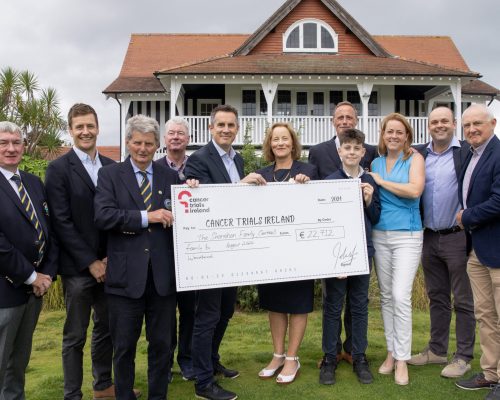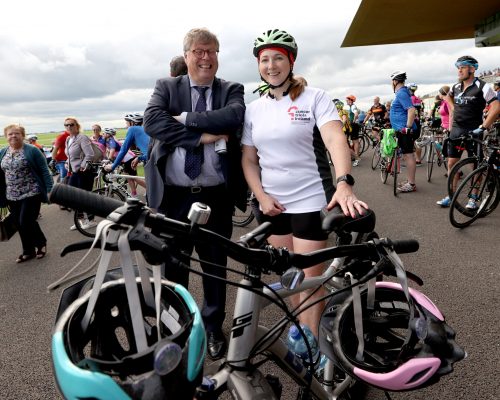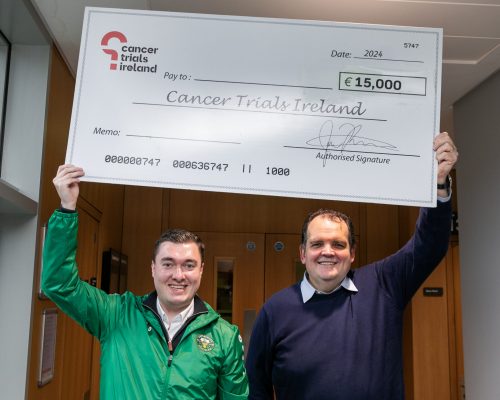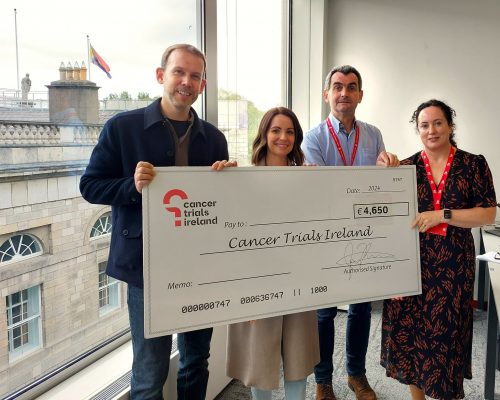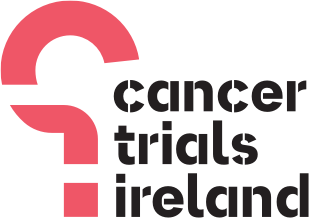Pat Smullen Pancreatic Cancer Fund
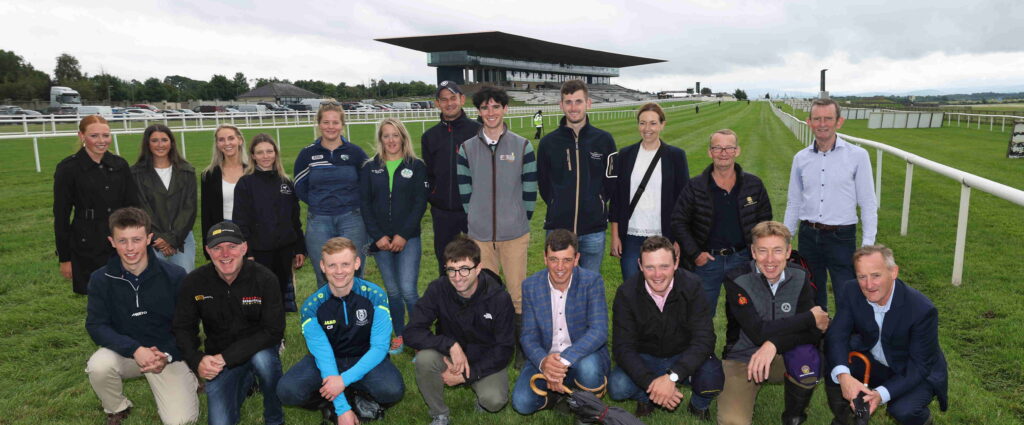
The Pat Smullen Race Day at the Curragh – Aug 30th 2025
The very best of luck to all the riders (most pictured above) in this year’s Charity Race at the Pat Smullen Race Day in aid of Cancer Trials Ireland at the Curragh.
This page details how the money raised by this event over several years – along with other donations – have enhanced the options for pancreatic cancer patients in Ireland.
If you would like to support pancreatic cancer research, click the Donate button in the menu bar / tab, and select Pancreatic / Pat Smullen Fund as the reference for your donation.

Pat Smullen Pancreatic Cancer Fund
Prior to fund being established, no pancreatic cancer trials open in Ireland.
In 2019, Cancer Trials Ireland received a donation of €2.6 million, dedicated exclusively to supporting research in pancreatic cancer in Ireland. This led to the establishment of the Pat Smullen Pancreatic Cancer Fund.
About Pancreatic Cancer
Pancreatic cancer has one of the poorest prognoses of all solid tumours. In Ireland each year around 600 people are diagnosed with pancreatic cancer with 495 dying from the disease. In Ireland it has a very poor five-year survival rate (8% approx.). Considerable progress is required to improve outcomes for pancreatic patients.
With an incidence that is far lower than the more common forms of cancer, such as breast, lung, and colorectal cancers, it doesn’t enjoy the same level of attention, advocacy, and patient support that other forms of cancers do. Furthermore, pancreatic cancer is difficult to treat, and difficult to study.
- Progress at a Glance
- The PATch trial opened in July 2023 in St Vincent's & Mater Hospitals. To date, 16 patients from an overall target of 22 have been recruited to the PATch trial for patients with advanced stage pancreatic cancer that have failed treatment.
- A radiotherapy study has opened to investigate if a novel radiation delivery technique can improve outcomes in patients with operable/borderline-operable pancreatic cancer. 3 patients have been accrued to date of a potential 67.
- 15 patients were recruited to Paricalcitol trial in 2020/2021
- 7 of 70 patients have been recruited to the FEED study, a nutritional intervention which aims to strengthen patient resilience and recovery from pancreas tumour surgery.
- €100,000 infrastructure grant to St Vincent’s University Hospital for NGS machine
- In all, new treatment options for up to 174 patients in Ireland, at no cost to themselves, or to the state.
The Pat Smullen Chair in Pancreatic Cancer at UCD
Cancer Trials Ireland is applauds the appointment of Professor Grainne O’Kane as the Pat Smullen Chair in Pancreatic Cancer at UCD.
The position will anchor expertise in pancreatic research in Ireland with the ambition of creating a global centre of excellence for treatment and research of this form of cancer which has one of the poorest outcomes.
The cancer cells manage to thrive in a ‘hostile’ environment in the body i.e. within the scar tissue of a tumour, where the cells themselves are spread out in a matrix-like pattern. This ‘hostile’ environment doesn’t receive a lot of blood flow, which contributes to making the usual treatments (chemo & radiotherapy) less effective than with other cancers.
Two main reasons:
- Biopsies of pancreatic cancer can be difficult to get, due to the location of the pancreas, and
- even when large tumour samples are extracted, they often provide very few cancer cells to study, due to the diffuse spread of cells in the surrounding tissue.
All of these factors contribute to the deadly, and deserved, reputation that pancreatic cancer has. Pancreatic cancer affects almost 600 people in Ireland each year.
The objective of the Pat Smullen Pancreatic Cancer Fund is as follows:
- Build lasting infrastructure in Ireland to aid with the diagnosis and treatment of pancreatic cancer.
- Fund research to improve the diagnosis, knowledge and treatment of pancreatic cancer in Ireland.
Fund New Cancer Trials Ireland Pancreatic Clinical Research
A proportion of the Pat Smullen Pancreatic Cancer Fund was used to establish the Pancreatic Cancer Award to fund new research in pancreatic cancer in Ireland.
How funding is being used to better the lives of pancreatic cancer patients?
- 15 patients were recruited to a trial that investigated a possible route to improving the effect of chemotherapy in people with newly diagnosed pancreatic cancer (Paricalcitol).
- A further 22 patients will be recruited to a trial for patients with advanced stage pancreatic cancer that have failed treatment. The hope is this trial may give participating patients a few more months of life (PATCH).
- A radiotherapy study will recruit 67 patients with operable / borderline-operable pancreatic cancer, in order to investigate if radiotherapy that directly targets a tumour using modern treatment planning, imagery and delivery can improve patient outcomes (DP_IMRT)
- 70 patients will be recruited to the FEED study, a nutritional intervention which aims to strengthen patient resilience and recovery from pancreas tumour resection (surgery). This study had a successful pilot programme, and models similar approaches established in other kinds of cancer.
In Detail: Infrastructure
A €100,000 Infrastructure grant was provided to St. Vincent’s University Hospital (SVUH) to support the procurement of state-of-the-art genetic sequencing equipment that will enhance the diagnosis and management of pancreatic cancer and also enable the SVUH multidisciplinary team to participate in research and clinical trials related to pancreatic cancer patients.
The equipment will allow sophisticated analysis of tumours at a molecular / genetic level and is known as “Next Generation Sequencing” (NGS). This technology has transformed the treatment of cancer patients as each tumour tissue sample can be tested for up to 50 mutations in one analysis. The identification of these mutations is essential to allow patients with pancreatic cancer access to so-called “targeted therapies” where a drug is designed to act specifically on a mutation in the cancer cells. The benefits to the patient with these new targeted therapies is that in many cases they will replace the need for conventional chemotherapy and radiotherapy approaches which are associated with higher risk of complications.


reviewed the installed NGS Machine
Fund Research Staff for Pancreatic Clinical Research
Cancer Trials Ireland is considering funding research positions within Cancer Trials Ireland and/or at the Cancer Trials Ireland hospital sites to support pancreatic clinical research. The purpose of this fund is to buy out a proportion of the time of clinical research personnel in a pancreatic cancer related specialist field. Examples include but are not limited to Clinical Project Managers, Research Nurses, Data Managers, Clinicians and Research Scientists. Please note that in the event of an award, this will fund protected time for the recipient. It is not for funding a specific research project or consumables.
Pat Smullen Fund Committee Members
- Frances Crowley
- Prof Ray McDermott, Clinical Leadership, Cancer Trials Ireland
- Eibhlín Mulroe, CEO, Cancer Trials Ireland
- Dr Verena Murphy, Head of Research & Business Development, Cancer Trials Ireland
Fundraising supporting pancreatic cancer research
- Doug Veale €168,500
- Shanahan Family/Woodbrook Golf Club €22,700
- Brian Cummins/Castleknock Celtic Football Club €15,000
- Rory Duggan €4,650
- Pat Smullen Race Day (2023) €247,000
